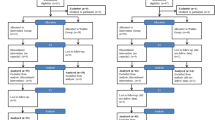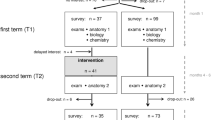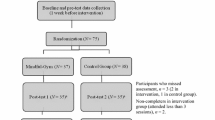Abstract
There is a growing interest in developing mindfulness skills in the context of education as a means to improve psychological well-being together with work-related skills and performance of children and adolescents. Here, we report findings from a feasibility pilot study exploring the acceptability and impact of a mindfulness-based stress reduction (MBSR) course with mixed-gender self-selected sixth-form students (N = 23; age 16–18) studying for General Certificate of Education (GCE) examinations. The study followed a non-randomized controlled design with a 3-month follow-up. Participants (11 in the training group, 13 controls) reported on the acceptability of the course after its completion. In addition, they completed self-report measures assessing depression, anxiety, stress (DASS 21) and well-being (WHO-5) before the start of the MBSR training (Time 1), after its completion (Time 2) and at follow-up (Time 3). The impact of participation on academic attainment and medical absences was also evaluated. The MBSR course attendance rates were very high (94 %), attrition rate was very low (one participant) and 90 % of the course attendees said they would recommend the course to others. We have also found medium-size effect differences between the training and control groups on depression scores at T2 (d = 0.57, p = 0.09, one-tailed) and T3 (d = 0.57, p = 0.08, one-tailed), with the training group scoring lower. In addition, there was a medium-size effect on anxiety reduction from T2 to T3 (d = 0.74, p = 0.07, two-tailed) in the training group only. The results also revealed a medium-size effect difference in academic attainment between the two groups at T3 (d = 0.65, p = 0.08, one-tailed), with students in the training group achieving better grades—a difference which equates to nearly one GCE grade per subject. Our findings suggest that the MBSR programme may be an acceptable and effective intervention for self-selected groups of sixth-form students, and participation in the MBSR course may benefit sixth-form students by improving their psychological health and supporting them in achieving their academic potential. Further larger scale studies are needed to provide conclusive evidence.

Similar content being viewed by others
References
Antony, M. M., Bieling, B. J., Cox, B. J., Enns, M. W., & Swinson, R. P. (1998). Psychometric properties of the 42-item and 21-item versions of the Depression Anxiety Stress Scales in clinical groups and a community sample. Psychological Assessment, 10(2), 176–181.
Assessment and Qualifications Alliance (AQA). (2013a). Finding past papers and mark schemes. Retrieved from, http://www.aqa.org.uk/exams-administration/exams-guidance/find-past-papers-and-mark-schemes.
Assessment and Qualifications Alliance (AQA). (2013b). GCE UMS/points grade boundaries. Retrieved from http://www.aqa.org.uk/exams-administration/about-results/grade-boundaries.
Barnes, V. A., Davis, H. C., Murzynowski, J. B., & Treiber, F. A. (2004). Impact of meditation on resting and ambulatory blood pressure and heart rate in youth. Psychosomatic Medicine, 66, 909–914.
Biegel, G. M., Brown, K. W., Shapiro, S. L., & Schubert, C. (2009). Mindfulness-based stress reduction for the treatment of adolescent psychiatric outpatients: a randomised clinical trial. Journal of Clinical Psychology, 77, 855–866.
Blacker, M., Meleo-Meyer, F., Kabat-Zinn, J., & Santorelli, S. (2009). University of Massachusetts: Centre for Mindfulness in Medicine, Health Care, and Society. Worcester: University of Massachusetts Medical School. Stress reduction clinic mindfulness-based stress reduction (MBSR) curriculum guide.
Brown, K. W., West, A. M., Loverich, T. M., & Biegel, G. M. (2011). Assessing adolescent mindfulness: validation of an adapted mindful awareness attention scale in adolescent normative and psychiatric populations. Psychological Assessment, 23(4), 1023–33. doi:10.1037/a0021338.
Burke, C. A. (2009). Mindfulness-based approaches with children and adolescents: a preliminary review of current research in an emergent field. Journal of Child & Family Studies, 19, 133–144.
Carmody, J., & Baer, R. A. (2008). Relationships between mindfulness practice and levels of mindfulness, medical and psychological symptoms and well-being in a mindfulness-based stress reduction program. Journal of Behavioural Medicine, 31(1), 23–33.
Centre for Economic Performance Mental Health Policy Group. (2012). Report of the Centre for Economic Performance Mental health Policy Group: how mental illness looses out in the N.H.S. London: London School of Economics and Political Science.
Chiesa, A., & Serretti, A. (2009). Mindfulness-based stress reduction management in healthy people: a review and meta-analysis. Journal of Alternative and Complimentary Medicine, 15(5), 593–600. doi:10.1089/acm.2008.0495.
Cohen, S., Kamarck, T., & Mermelstein, R. (1983). A global measure of perceived stress. Journal of Health and Social Behavior, 24, 385–396.
Collishaw, S., Maughan, B., Natarajan, L., & Pickles, A. (2010). Trends in adolescent emotional problems in England: a comparison of two national cohorts twenty years apart. Journal of Child Psychology and Psychiatry, 51(8), 885–894. doi:10.1111/j.1469-7610.2010.02252.x.
Crane, R., Eames, C., Kuyken, W., Hastings, R. P., Williams, M., Bartley, T., & Surawy, C. (2013). Development and validation of the mindfulness-based interventions teaching assessment criteria (MBI:TAC). Assessment, 20(6), 681–688. doi:10.1177/1073191113490790.
Cumming, G. (2012). Understanding the new statistics: effect sizes, confidence intervals, and meta-analysis. New York: Routledge.
de Wit, M., Pouwer, F., Reinoud, J. B. J., Gemke, M. D., Delemarre van de Waal, H. A., & Snoek, F. A. (2007). Validation of the WHO-5 Well Being Index in adolescents with type 1 diabetes. Diabetes Care, 30(8), 2003–2006.
Department of Education. (2014). Mental health and behaviour in schools: departmental advice for school staff (p. DFE-00435-2014). London: Government Publications.
Felver, J. C., Celis-de Hoyos, C. E., Tezanos, K., & Singh, N. N. (2015). A systematic review of mindfulness-based interventions for youth in school settings. Mindfulness, 1–12.
Fisher Family Trust. (2011). Academic performance data. Retrieved September 2013, from http://www.fisherfamilytrust.org.
Grossman, P., & Van Dam, N. T. (2011). Mindfulness by any other name… trials and tribulations of sati in Western psychology and science. Contemporary Buddhism: An Interdisciplinary Journal, 12(1), 219–239.
Grossman, P., Niemann, L., Schmidt, S., & Walach, H. (2004). Mindfulness-based stress reduction and health benefits: a meta-analysis. Journal of Psychosomatic Research, 57, 35–43.
Hagell, A. (2012). Changing adolescence: social trends and mental health. Bristol: Policy Press.
Hagell, A., Coleman, J., & Brooks, F. (2013). Key data on adolescence 2013. London: Association for Young People’s Health. CAN’T FIND IN MAIN TEXT.
Henry, J. D., & Crawford, J. R. (2005). The short-form version of the Depression Anxiety Stress Scales (DASS-21): construct validity and normative data in a large non-clinical sample. British Journal of Clinical Psychology, 44(2), 227–239.
Heun, R., Burkart, M., Maler, W., & Bech, P. (1999). Internal and external validity of the WHO Well-Being Scale in the elderly general population. Acta Psychiatrica Scandinavica, 99(3), 171–178.
Hofmann, S. G., Sawyer, A. T., Witt, A. A., & Oh, D. (2010). The effect of mindfulness-based therapy on anxiety and depression: a meta-analytic review. Journal of Consulting and Clinical Psychology, 78(2), 169–183.
Kabat-Zinn, J. (1990). Full catastrophe living: using the wisdom of your body and mind to face stress, pain and illness. New York: Dell. 15th anniversary ed., 2005.
Kabat-Zinn, J. (2011). Some reflections on the origins of MBSR, skilful means, and the trouble with maps. Contemporary Buddhism: An Interdisciplinary Journal, 12(1), 281–306.
Khoury, B., Lecompte, T., Fortin, G., Masse, M., Therien, P., Bouchard, V., & Hofman, S. G. (2013). Mindfulness-based therapy: a comprehensive meta-analysis. Clinical Psychology Review, 33, 763–771. doi:10.1016/j.cpr.2013.05.005.
Kuyken, W., Weare, K., Ukoumunne, O. C., Vicary, R., Motton, N., Burnett, R., & Huppert, F. (2013). Effectiveness of the mindfulness in schools programme: non-randomised controlled feasibility study. British Journey of Psychiatry, 213, 2. doi:10.1192/bjp.bp.113.126649.
Lawlor, M. S., Schonert-Reichl, K. A., Gadermann, A. M., & Zumbo, B. D. (2013). A validation study of the mindful attention awareness scale adapted for children. Mindfulness, 5(6), 730–741. doi:10.1007/s12671-013-0228-4.
Lovibond, S. H., & Lovibond, P. F. (1995). Manual for the Depression Anxiety Stress Scales (2nd ed.). Sydney: Psychology Foundation.
Lowe, B., Spitzer, R. L., Gräfe, K., Kroenke, K., Quenter, A., Zipfel, S., & Herzog, W. (2004). Comparative validity of three screening questionnaires for DSM-IV depressive disorders and physicians’ diagnoses. Journal of Affective Disorders, 78(2), 131–140.
Lustyk, K., Chawla, N., Nolan, R., & Marlatt, G. A. (2009). Mindfulness meditation research: Issues of participant screening, safety procedures, and researcher training. Advances in Mind-Body Medicine, 24, 20–30.
Masten, A. S., & Motti-Stefanidi, F. (2009). Understanding and promoting resilience in children: promotive and protective processes in schools. In T. B. Gutkin & C. R. Reynolds (Eds.), The handbook of school psychology (4th ed., pp. 721–738). New York: Wiley.
Meiklejohn, J., Phillips, C., Freedman, M. L., Griffiths, M. L., Biegel, G., Roach, A., & Saltzman, A. (2012). Integrating mindfulness training into K-12 education: fostering the resilience of teachers and students. Mindfulness, 3(4), 291–307. doi:10.1007/s12671-012-0094-5.
National Research Council and Institute of Medicine of the National Academies. (2009). Preventing mental, emotional and behavioural disorders among young people: progress and possibilities. Washington, DC: The National Academies Press.
Osman, A., Wong, J. L., Bagge, C. L., Freedenthal, S., Gutierrez, P. M., & Lozano, G. (2012). The Depression Anxiety Stress Scales-21 (DASS-21): further examination of dimensions, scale reliability, and correlates. Journal of Clinical Psychology, 68(12), 1322–38. doi:10.1002/jclp.21908.
Peacock, E. J., & Wong, P. T. P. (1990). The Stress Appraisal Measure (SAM): a multidimensional approach to cognitive appraisal. Stress Medicine, 6, 227–236. doi:10.1002/smi.2460060308.
Santorelli, S. & Kabat-Zinn, J. (eds) (2013). Mindfulness-based stress reduction (MBSR) professional education and training resource manual. Shrewsbury, MA. University of Massachusetts: Centre for Mindfulness in Medicine, Health Care, and Society.
Schonert-Reichel, K. A., & Lawlor, S. M. (2010). The effect of a mindfulness-based education program on pre- and early adolescents’ well-being and social and emotional competence.’. Mindfulness, 1, 137–151.
Semple, R. J., Lee, J., Rosa, D., & Miller, L. F. (2010). A randomised trial of mindfulness-based cognitive therapy for children: promoting mindful attention to enhance social-emotional resiliency in children. Journal of Child Family Studies, 19, 218–229.
Shaw, J. (2000). Children, adolescents and trauma. Psychiatric Quarterly, 71(3), 227–243.
Sinclair, S. J., Siefert, C. J., Slavin-Mulford, J. M., Stein, M. B., Renna, M., & Blais, M. A. (2012). Psychometric evaluation and normative data for the depression, anxiety, and stress scales-21 (DASS-21) in a nonclinical sample of U.S. adults. Evaluation and the Health Professions, 35(3), 259–279. doi:10.1177/0163278711424282.
Teasdale, J. D., & Chaskalson, M. (2011). How does mindfulness transform suffering? II: the transformation of dukkha. Contemporary Buddhism: An interdisciplinary journal, 12(1), 103–124.
Wall, R. B. (2005). Tai chi and mindfulness-based stress reduction in a Boston public middle school. Journal of Paediatric Health Care, 19, 230–237.
World Health Organization Regional Office for Europe and the International Diabetes Federation, Europe. (1990). Diabetes mellitus in Europe: a problem at all ages and in all countries: a model for prevention and self care. G Ital Diabetol, 10, 1–14.
Zenner, C., Herrnleben-Kurz, S., & Walach, H. (2014). Mindfulness-based interventions in schools—a systematic review and meta-analysis. Frontiers in Psychology, 5, 603.
Zoogman, S., Goldberg, S. B., Hoyt, W. T., Miller, L. (2014). Mindfulness interventions with youth: A meta-analysis. Mindfulness, 4, 179–189.
Author information
Authors and Affiliations
Corresponding author
Rights and permissions
About this article
Cite this article
Bennett, K., Dorjee, D. The Impact of a Mindfulness-Based Stress Reduction Course (MBSR) on Well-Being and Academic Attainment of Sixth-form Students. Mindfulness 7, 105–114 (2016). https://doi.org/10.1007/s12671-015-0430-7
Published:
Issue Date:
DOI: https://doi.org/10.1007/s12671-015-0430-7




